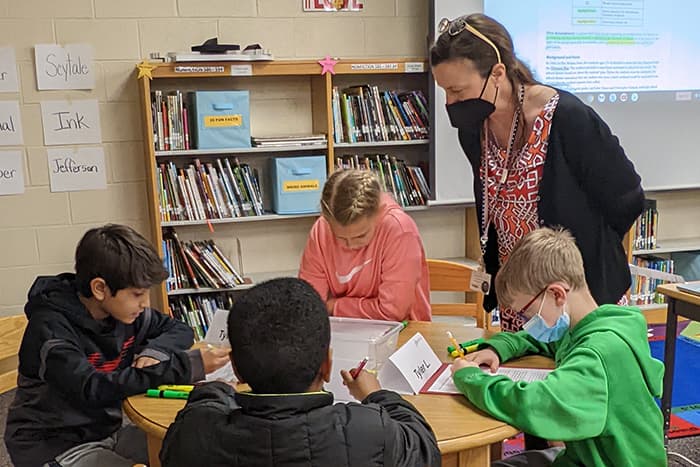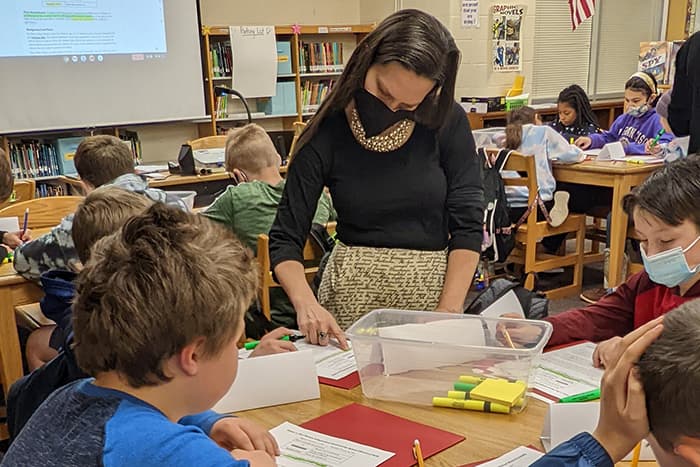HCPSS Staff Team Up to Educate Students on Civil Discourse and Debate
May 10th, 2022

Instructional Mentor for Secondary Social Studies Kelly Reichardt and Lisbon Elementary School Library Media Specialist Stephanie Hastings have worked together for several years, first jointly writing a third-grade social studies curriculum and later developing a series of elementary social studies modules in Canvas. They subsequently worked together with the Maryland State Department of Education (MSDE) and Maryland Public Television to create original fourth- and fifth-grade social studies online courses, including student-facing lessons and teacher guides.
Reichardt and Hasting’s most recent collaboration began in the fall of 2021, when they were selected to participate in the Current and Contested Issues cohort project, a partnership between MSDE and Street Law, Inc., a global, nonpartisan, nonprofit organization that develops classroom and community programs about law and government. The project tasked participants with creating a lesson that would teach students Street Law’s eight-step deliberation and discussion model and have them apply it to a discussion on a contested political topic.
Given the sophisticated nature of content it was intended to cover, the Street Law curriculum was originally designed with high school students in mind. However, the Current and Contested Issues cohort project allowed Reichardt and Hastings to explore whether, with some modifications, it could be done at the elementary level as well.
Out of their research came a two-day lesson (compliant with Board of Education Policy 8050 Teaching of Controversial Issues) for fifth-grade students, centering on Tinker v. Des Moines Independent Community School District. The 1969 Supreme Court case ruled that, under the First Amendment Freedom of Speech, students had the right to wear armbands to school in protest of the Vietnam War and could not be suspended from school for doing so.
“We chose Tinker because we felt it was a case to which younger students could understand and relate,” explains Reichardt. “We also felt that this case tied in well with the fifth-grade curriculum, which examines the Bill of Rights and the First Amendment.”

The lesson began with a brief introduction to the Vietnam War and the division in public opinion about the war that existed at the time.
“We wanted to make sure that students understood the context in which this case arose,” says Reichardt.
From there, Reichardt and Hastings guided students through a modified version of the Street Law deliberation process, in which they had to identify the essential issue under debate, identify gaps in their knowledge, and vote on whether they thought the students in Des Moines should have been suspended from school for wearing armbands or not.
On day two of the lesson, students analyzed primary and secondary resources related to Tinker. They worked with a partner to review one side of the case and determine that side’s two strongest arguments. The pair then worked with another pair, who had been tasked with identifying the two strongest opposing arguments, and conducted a structured discussion and debate. The pairs later switched sides and repeated the discussion/debate.
“With this setup, we compelled the students to look at and argue the case from both sides,” explains Hastings. “In the process, we also gave students the opportunity to learn about and practice civil discourse. We helped them to see that it’s possible to disagree—and even argue—without getting out of control, losing sight of the facts, or personally attacking one another.”
The lesson concluded with the reveal and class discussion of the Supreme Court’s decision in the Tinker case. Students also had the opportunity to ask any questions they still had about the case.
For Hastings and Reichardt, the overall experience was rewarding and telling.
“Teaching this lesson made clear that elementary school students are capable of seeing and understanding multiple sides of a complex issue and can engage in a civil debate,” Hastings says. “We need to give students opportunities to do this, as they can and will rise to the challenge.”
“Current events and contested issues will always exist,” Reichardt adds. “Our role as educators is to develop engaged and active citizens who know how to find and evaluate information on these types of issues, discuss them in a civil manner, and make informed decisions.”
To conclude their cohort project, Reichardt and Hastings will present the findings from their research on May 25 at the Maryland Council for Social Studies spring conference.
 HCPSS
HCPSS